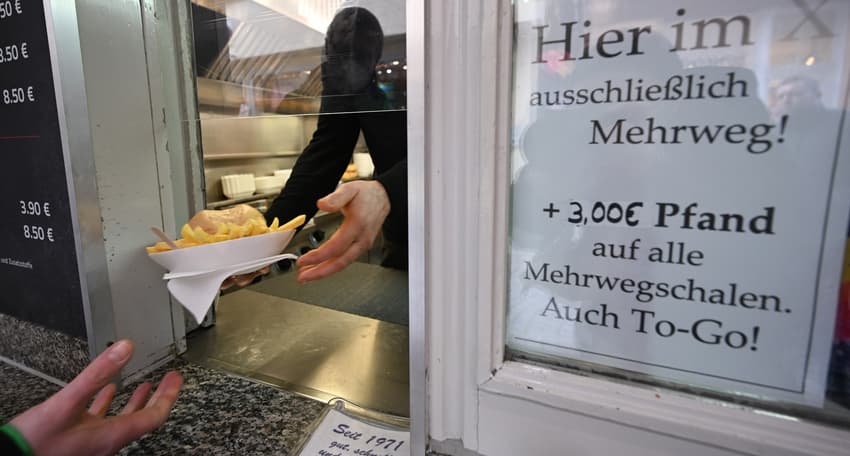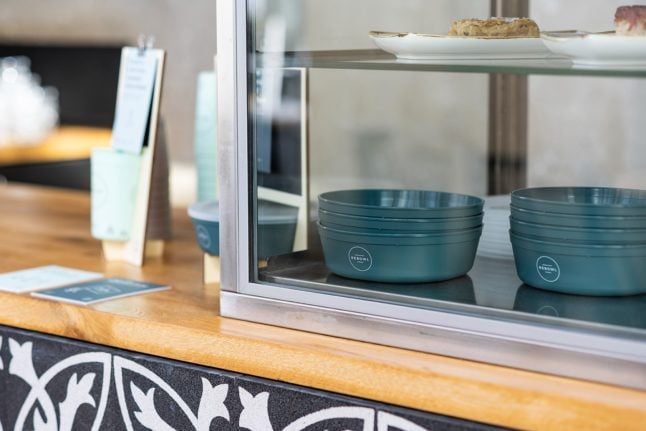How customers in Germany can demand multi-use packaging from 2023

From January 1st, restaurants and other places offering takeaway food will have to provide multi-use packaging in Germany. Here's what the new system means for customers.
What's changing for take-away customers in January?
From the start of next year, customers in Germany will have a right to receive their to-go food and beverages in reusable packaging.
Originally passed in 2021, the new packaging law is set to come in in the new year, having given businesses time to prepare multi-use options. Whether they are restaurants, bistros, or cafes – any business selling food or drinks to go has to adhere to the new law.
Furthermore, businesses cannot disincentivise customers from choosing reusable options by making them more expensive than disposable plastic. They can get around this a little bit, as businesses are allowed to charge customers a deposit for a reusable container. The customer can get this back by bringing back the container although many to-go customers may not end up doing this.
What kind of businesses does this apply to?
The general rule of thumb is that if you can buy a coffee, drink or food to-go there, you should be able to take it away in a container or cup that can be washed and reused.
That means that, as well as cafes and restaurants, the law also applies to canteens and petrol stations. However, there are exceptions for small shops and snack bars that have a maximum of five employees and are no more than 80 square metres in size. Even for these shops though, customers can still ask that their reusable containers be filled if they’ve brought them themselves. So if you're used to getting your daily coffee from the Späti, you can always bring a flask from home if you want a more eco-friendly option.
Chain bakeries will also be subject to the new rules, regardless of the number of employees or how much floorspace they have.
READ ALSO: Food waste or gourmet grub? How one German hotel is changing the culture of leftovers
What other rules do businesses have to follow?
Businesses are also required to clearly indicate – in large print, for example – that they have reusable options available. This has to be done at the point of sale, which means delivery services could print the information in a flyer that's delivered alongside the food, while cafes and fast-food restaurants could put a sign on the counter.
How will this work in practice?
This all depends on the business, but most will involve customers returning their containers in a kind of 'Pfand' or deposit system.
Operators are initially only obliged to take back their own issued reusable packaging, but there are also operators who are cooperating with third parties who offer reusable systems. These make it possible, for example, to buy a to-go coffee in a reusable cup at Hamburg Central Station and return it to a café in Berlin.

The multi-use packaging brand Rebowl in a local cafe. Third party solutions could offer a way for customers to return their packaging to multiple locations. Photo: picture alliance/dpa/reCup GmbH | reCup GmbH
Some systems charge a deposit, while others work with an app-based registration system. The range of options is already extensive and, in the view of the Environment Ministry, is likely to increase when the mandatory reusable offer comes into force.
The fast-food chain McDonald's, for example, has announced that it will offer its own reusable packaging system for a €2 deposit. Burger King, on the other hand, is working with a reusable system provider, so customers will also be able to return their reusable cups at all of the outlets that work with this provider. According to the company, each reusable cup can replace up to 1,000 disposable cups over the course of its life.
What's the thinking behind this?
Single-use plastic and other packaging is a major source of waste, putting a huge strain both on the environment and on local governments.
According to the Consumer Centre in Berlin, people living in Germany produce 770 tons of packaging waste per day from takeaway packaging for food and beverages. A study commissioned by the Federal Environment Agency also found that disposable plastic products alone - such as to-go cups, food packaging, carrier bags, cigarette butts - cause municipal cleaning costs of around €434 million per year.
READ ALSO: Germans waste 55 kg per person of food per year
Of course, there's some scepticism about whether this latest legislation goes far enough. Though takeaway restaurants and cafes will be forced to provide more eco-friendly packaging options, there's no guarantee that customers will actually ask for them.
Is this the first step towards banning single-use packaging entirely?
According to the German Environment Ministry, a complete ban on single-use packaging isn't yet possible under EU law. And for some products - like disposable cups - an outright ban makes no sense because we don't yet have a fully eco-friendly alternative.
However, certain products made of single-use plastic have been banned since July 2021. These include disposable products such as disposable cutlery and plates, drinking straws, stirrers, cotton swabs and disposable food containers made from styrofoam.
The EU Commission will review the bans in 2027 and possibly extend them to other products.
Comments
See Also
What's changing for take-away customers in January?
From the start of next year, customers in Germany will have a right to receive their to-go food and beverages in reusable packaging.
Originally passed in 2021, the new packaging law is set to come in in the new year, having given businesses time to prepare multi-use options. Whether they are restaurants, bistros, or cafes – any business selling food or drinks to go has to adhere to the new law.
Furthermore, businesses cannot disincentivise customers from choosing reusable options by making them more expensive than disposable plastic. They can get around this a little bit, as businesses are allowed to charge customers a deposit for a reusable container. The customer can get this back by bringing back the container although many to-go customers may not end up doing this.
What kind of businesses does this apply to?
The general rule of thumb is that if you can buy a coffee, drink or food to-go there, you should be able to take it away in a container or cup that can be washed and reused.
That means that, as well as cafes and restaurants, the law also applies to canteens and petrol stations. However, there are exceptions for small shops and snack bars that have a maximum of five employees and are no more than 80 square metres in size. Even for these shops though, customers can still ask that their reusable containers be filled if they’ve brought them themselves. So if you're used to getting your daily coffee from the Späti, you can always bring a flask from home if you want a more eco-friendly option.
Chain bakeries will also be subject to the new rules, regardless of the number of employees or how much floorspace they have.
READ ALSO: Food waste or gourmet grub? How one German hotel is changing the culture of leftovers
What other rules do businesses have to follow?
Businesses are also required to clearly indicate – in large print, for example – that they have reusable options available. This has to be done at the point of sale, which means delivery services could print the information in a flyer that's delivered alongside the food, while cafes and fast-food restaurants could put a sign on the counter.
How will this work in practice?
This all depends on the business, but most will involve customers returning their containers in a kind of 'Pfand' or deposit system.
Operators are initially only obliged to take back their own issued reusable packaging, but there are also operators who are cooperating with third parties who offer reusable systems. These make it possible, for example, to buy a to-go coffee in a reusable cup at Hamburg Central Station and return it to a café in Berlin.

Some systems charge a deposit, while others work with an app-based registration system. The range of options is already extensive and, in the view of the Environment Ministry, is likely to increase when the mandatory reusable offer comes into force.
The fast-food chain McDonald's, for example, has announced that it will offer its own reusable packaging system for a €2 deposit. Burger King, on the other hand, is working with a reusable system provider, so customers will also be able to return their reusable cups at all of the outlets that work with this provider. According to the company, each reusable cup can replace up to 1,000 disposable cups over the course of its life.
What's the thinking behind this?
Single-use plastic and other packaging is a major source of waste, putting a huge strain both on the environment and on local governments.
According to the Consumer Centre in Berlin, people living in Germany produce 770 tons of packaging waste per day from takeaway packaging for food and beverages. A study commissioned by the Federal Environment Agency also found that disposable plastic products alone - such as to-go cups, food packaging, carrier bags, cigarette butts - cause municipal cleaning costs of around €434 million per year.
READ ALSO: Germans waste 55 kg per person of food per year
Of course, there's some scepticism about whether this latest legislation goes far enough. Though takeaway restaurants and cafes will be forced to provide more eco-friendly packaging options, there's no guarantee that customers will actually ask for them.
Is this the first step towards banning single-use packaging entirely?
According to the German Environment Ministry, a complete ban on single-use packaging isn't yet possible under EU law. And for some products - like disposable cups - an outright ban makes no sense because we don't yet have a fully eco-friendly alternative.
However, certain products made of single-use plastic have been banned since July 2021. These include disposable products such as disposable cutlery and plates, drinking straws, stirrers, cotton swabs and disposable food containers made from styrofoam.
The EU Commission will review the bans in 2027 and possibly extend them to other products.
Join the conversation in our comments section below. Share your own views and experience and if you have a question or suggestion for our journalists then email us at [email protected].
Please keep comments civil, constructive and on topic – and make sure to read our terms of use before getting involved.
Please log in here to leave a comment.